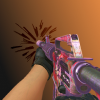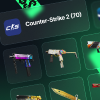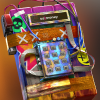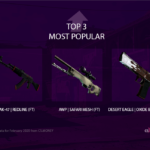
The community’s contributions are essential to Counter-Strike: Global Offensive. Almost all competitive maps were created by players. Skins and stickers, too. Seeing your creation in the game is both heart-warming and profitable. The CS.MONEY Blog tried to figure out how to get your skin from the Workshop into that next case.
High competition

Finishes that make it into the game bring their creators a decent income. Artists can earn up to $100,000 a year — or even more. Incredible! But first, your skin needs to actually become part of the game. That’s the hardest part, preceded by several stages.
The competition among skin-makers is extremely high. Valve stated that the Dreams & Nightmares contest saw over 15,000 entries. Even assuming that some of the designs were of poor quality, each artist was still competing against hundreds of fellow skin-makers.
It’s hard to win a race like that. Moreover, it was a contest with a predetermined theme and a given list of guns. Normally, artists don’t even have this information. Everyone competes with everyone else.
Cases & conditions

All skins come into the game as part of collections. In a number of isolated examples, a collection consists of a single skin, but usually, it’s a set of finishes devoted to the same theme. The collections themselves may be part of a case or released separately — for instance, as part of an operation.
When and which collections get added to the game is up to Valve. The company typically doesn’t disclose info about future cases — nor does it name the criteria it uses for selecting gun looks. So on the one hand, the artists enjoy lots of creative leeway, but on the other, they don’t have clear criteria, other than those named by the company.
Valve offers an exceptionally succinct and clear-cut list of requirements concerning skins in the Workshop. Items with offensive images, religious and political symbols immediately get rejected. Finishes that violate copyrights and completely golden guns end up in the trash can as well.
Concept & implementation

The Dreams and Nightmares contest revealed the approximate thought process of the company in the selection of entries. For example, one of the requirements was a description! That’s a most interesting point: usually, the description of a Workshop skin will consist of a couple of words. Sometimes, it’s just blank space. While we’re not going to extrapolate the conditions of the contest to Valve’s skin selection process in general, it’s still clear that Valve is interested not only in a pretty picture but also in the idea behind it.
The FAQ on creating weapon finishes features this information too. The company recommends creating skins in six steps. Here they are, in order:
- Come up with an idea;
- Draw a design draft;
- Turn the draft into a complete skin;
- Make sure the skin meets the standards;
- Do a final check;
- Upload the item to the Workshop.
With that said, the first component of success has been established: in order to get your skin from the Workshop to the game, you need a concept. One that’s interesting and coherent, can be wrapped into a skin, and doesn’t look secondary. OK, not bad!
Amazing skills

Supposing you’ve got the idea stage covered — now it’s time for the execution. To create a skin, you require tools. The key ones are a graphics editor like Adobe Photoshop and a special program from Valve: Workbench. As for the former, you need to find your own software, but the latter is already integrated into Counter-Strike: Global Offensive. The fact that it’s built-in is pretty convenient, but unfortunately, that’s the only convenient thing about it.
The texture of the finish must be in the .TGA format. For normal skins, it’ll be a 24-bit file, and in case you use the alpha channel, the file must have 32 bits. Importantly, Counter-Strike: Global Offensive can’t work with .TGA. In order to feed the file to the game, you need to convert into the Valve Texture Format (VTF). Only after that will CS:GO be able to cover the gun in question with your picture.
Bottom line: even if you have a picture, bringing it into the game is a challenging task. The pictures themselves are the easier part. Even if you can’t draw, nothing’s stopping you from teaming up with an artist and collaborating. Luckily, there are no rules prohibiting joint work in the Workshop.
The second component has been found as well. For your skin to get into the game, you need to make sure your idea exists in the right type of file. To this end, you have to fulfill a number of technical requirements. And even though this is somewhat daunting, you can get used to it over time.
A lifetime supply of luck

Last but not least: luck. There the Workshop is an extraordinarily competitive environment. Right now, the rivalry is stronger than ever. The luck factor is even more significant for another reason: Valve doesn’t take into account public opinion during the selection process. Therefore, the likes in the Workshop or comments on the game’s subreddit won’t help directly. Nevertheless, it’s still better to promote your work. It’ll help you get useful criticism and further improve your designs.
In addition, we can’t but note another trend: Valve releases new cases on a regular basis. Every year witnesses the drop of at least three yellow boxes in the game! More often than not, these contain brand-new finishes. It’s on extremely rare occasions that items added to the game have been collecting dust in the Workshop for several years. So if you want to see your skin in-game, you’d better regularly create new works.
Creating a skin and its appearance in the game are two very complicated processes — but for different reasons. Creating a finish itself entails a lot of effort and work from a creative and technical point of view. Getting it into the case is difficult because of the high competition and the shroud of mystery that covers the selection criteria. All difficulties notwithstanding, it’s still an attainable goal. So if you want to see your look for the AK in the game, go ahead — you’ve every chance of succeeding.













